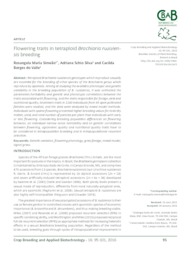Flowering traits in tetraploid Brachiaria ruziziensis breeding.
Flowering traits in tetraploid Brachiaria ruziziensis breeding.
Author(s): SIMEÃO, R. M.; SILV, A. S.; VALLE, C. B. do
Summary: Tetraploid Brachiaria ruziziensis genotypes which reproduce sexually are essential for the breeding of other species of the Brachiaria genus which reproduce by apomixis. Aiming at studying the available phenotypic and genetic variability in the breeding population of B. ruziziensis, it was estimated the parameters heritability and genetic and phenotypic correlations between the traits associated with flowering, and the traits responsible for forage yield and nutritional quality. Seventeen traits in 1180 individuals from 59 open pollinated families were studied, and the data were analyzed by mixed model methods. Individuals with sparse flowering presented higher breeding values for total dry matter, yield, and total number of panicles per plant than individuals with early or late flowering. Considering breeding population differences on flowering behavior, on individual narrow sense heritability and on genetic correlations between flowering, agronomic quality and nutritional quality traits have to be considered in intrapopulation breeding and in intrapopulational recurrent selection.
Publication year: 2016
Types of publication: Journal article
Unit: Embrapa Beef Cattle
Observation
Some of Embrapa's publications are published as ePub files. To read them, use or download one of the following free software options to your computer or mobile device. Android: Google Play Books; IOS: iBooks; Windows and Linux: Calibre.
Access other publications
Access the Agricultural Research Database (BDPA) to consult Embrapa's full library collection and records.
Visit Embrapa Bookstore to purchase books and other publications sold by Embrapa.

